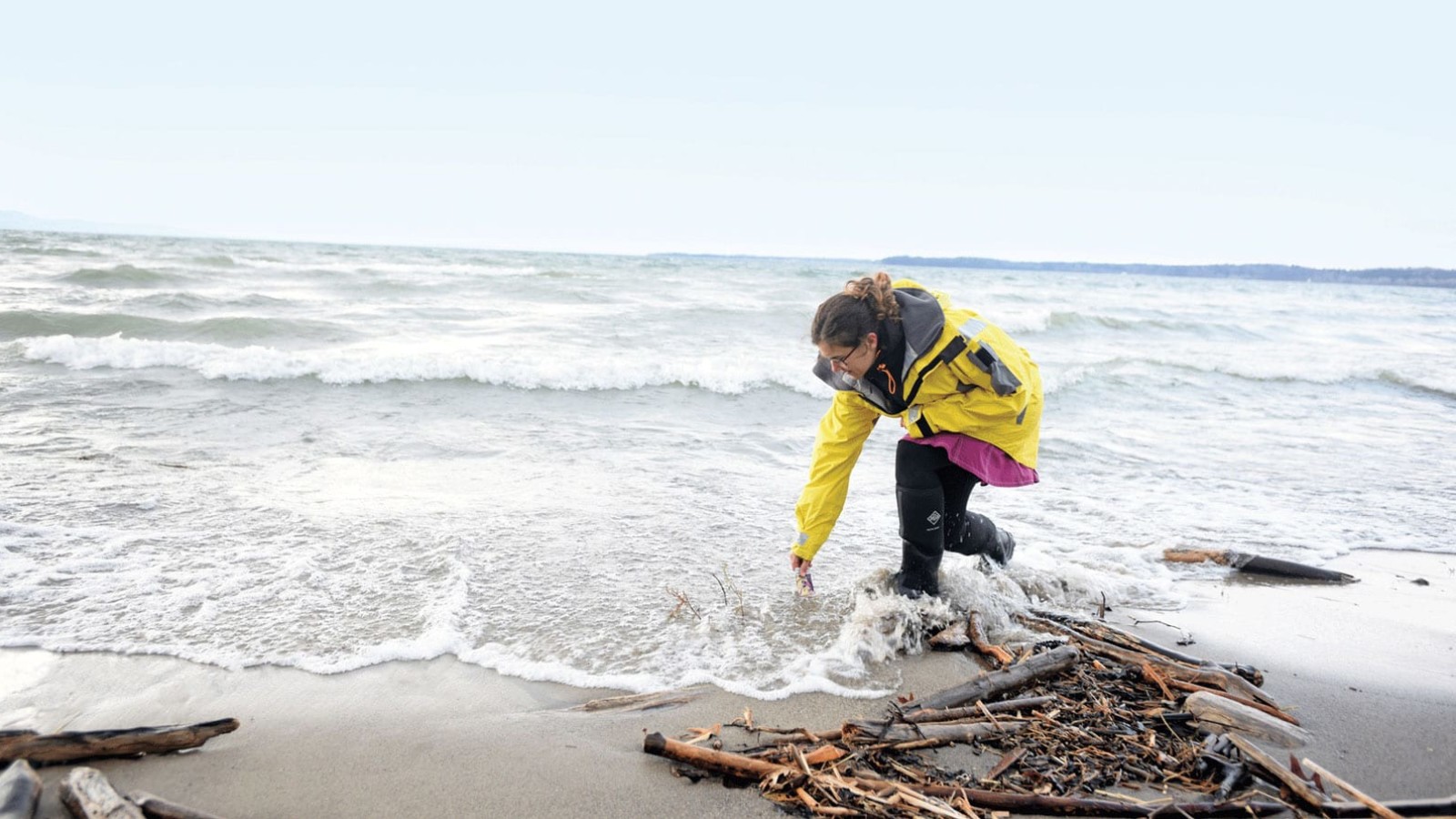Rachael Miller ’88 takes on the problem of marine debris by confronting it at its source
In the fall of 2009, Rachael Miller and her husband took a trip to Matinicus Island, off the coast of Maine, to try to figure out their lives. The two had been living on Lake Champlain in Vermont running an extreme water sports school and giving tours of shipwrecks using robotic underwater cameras, but Miller was feeling that something was missing. Matinicus is 20 miles out at sea (the name in Abenaki means “far out island”) and had just been hit by a Nor’easter the day before. The couple dropped off their bags and took a walk. “The beach next to our place was covered in trash, knee deep in plastic and foam and fishing gear, food wrappers and beer cans,” Miller recalls. “We spent the rest of the first day of our little vacation pulling that trash above the high tide line. And then my husband had an epiphany. ‘You hate trash in the water. It’s the one thing that really pisses you off. So let’s do something about it.’”
And thus was born the Rozalia Project for a Clean Ocean. An action-based environmental nonprofit (named for Miller’s great-grandmother), the project combines citizen science, experiential education, solutions-based research, and hands-on cleanup programs to focus attention and action on the problem of marine debris. From a floating headquarters, the 60-foot sloop American Promise (the “greenest sailing research vessel in the world”), Miller and her team host research expeditions for supporters and scientists, using those same robotic underwater cameras to document the trashing of the marine ecosystem, particularly at the land-sea interface. “Eighty percent of the marine debris problem is from land-based sources,” explains Miller, who captains the ship. “So we wanted to focus our work where we would have the most impact, and be most cost-effective, instead of waiting until trash is swirling around the center of our ocean circulation systems.” Through its various efforts, supported primarily by sponsorships and grants (from the National Geographic Society, among others), the group has gathered and recorded nearly a million pieces of marine debris.
In addition to prevention, research, and clean-up, Miller also advocates for and employs innovation as a pathway to cleaner oceans. Through Kickstarter, she and her team developed and are now marketing the Cora Ball, a grapefruit-size sphere made of twisted recyclable plastic. Place the Cora Ball in your washing machine, and it can collect about a quarter of the load’s microfibers—bits of material shed from fabrics that can contaminate downstream ecosystems, such as the ocean.
Underlying all of these efforts is Miller’s view that humanity needs to change its relationship with the materials we bring into the world. “If we could collectively do away with the idea of waste, then other activities would fall into line,” she argues. “We would design to keep everything in a circular economy, because everything has value. There isn’t waste.”
Raised in Saratoga, New York, Miller was drawn to Williston for its swimming and sailing teams, discovering only after she arrived that the latter had just been disbanded. Still, she says, the school proved a good fit. “It was a great combination of teacher-led learning and independent learning, which I really appreciated. And that’s the kind of environment in which I thrive. Ultimately, it set the stage for the kind of work I do now.”
Miller prefaces the discussion of her unusual career path by noting that she has “no hemisphere preference,” explaining that she is drawn equally to right- and left-brained pursuits and “always flip-flopped between art and science.” From Williston, she attended the University of Rochester, but after a semester on the ocean with the Sea Education Association and environmental studies programs in Australia and Mexico, she transferred to Brown University to pursue art semiotics. She would eventually earn her degree there, but not before changing her major yet again to underwater archaeology, “which for me ended up being the elusive blend of art and science.”
After Brown, Miller made a bid to compete in the Olympics in singlehanded sailing, training and raising money for the individual small-boat event. She didn’t make the team, but she did meet her future husband, an English sailor, and the two eventually settled in Vermont and opened Stormboarding, their extreme sports center.
Today, 10 years after the couple’s epiphany on Matinicus Island and the launch of the Rozalia Project, Miller says she has begun to see a societal shift in awareness around marine debris issues, and that leaves her optimistic that real change is possible. “There’s been this sort of mass recognition of the problem, a willingness to actually talk about it, to identify with it, and to identify consumption with marine debris,” she says. “If you go and sit on the street corner in a major city, you will see more people with reusable mugs, reusable bags, less single-use items, than we did five years ago. The Super Bowl was just zero waste! I used to go to ocean protection conferences and they were serving food on Styrofoam. That doesn’t happen anymore.”

